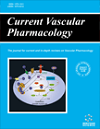Current Vascular Pharmacology - Volume 12, Issue 1, 2014
Volume 12, Issue 1, 2014
-
-
Statins: The Holy Grail of Abdominal Aortic Aneurysm (AAA) Growth Attenuation? A Systematic Review of the Literature
More LessBackground: In the era of Abdominal Aortic Aneurysm (AAA) screening, pharmacotherapies to attenuate AAA growth are sought. HMG Co-A reductase inhibitors (statins) have pleiotropic actions independent of their lipid lowering effects and have been suggested as potential treatment for small AAAs. We systematically review the clinical evidence for this effect. Methods: Medline, EMBASE and the Cochrane Central Register of Controlled Trials (1950-2011) were searched for studies reporting data on the role of statin therapy on AAA growth rate. No language restrictions were placed on the search. References of retrieved articles and pertinent journals were hand searched. Included studies were reviewed by 2 independent observers. The search retrieved 164 papers, 100 were irrelevant based on their title, 47 were reviews and 1 was a letter. 8 studies were excluded based on review of their abstract leaving 8 for inclusion in the study. Results: Eight observational clinical studies with a total of 4,466 patients were reviewed. Four studies demonstrated reduced AAA expansion in statin users while 4 studies failed to demonstrate this effect. The method of determining AAA growth rates varied significantly between the studies and the ability of many studies to control for misclassification bias was poor. Conclusions: The claim that statins attenuate AAA growth remains questionable. Further prospective studies with stringent identification and verification of statin usage and a standardised method of estimating AAA growth rates are required. Statin type and dose also merit consideration.
-
-
-
Sulodexide Down-Regulates the Release of Cytokines, Chemokines, and Leukocyte Colony Stimulating Factors from Human Macrophages: Role of Glycosaminoglycans in Inflammatory Pathways of Chronic Venous Disease
More LessAuthors: Ferdinando Mannello, Daniela Ligi, Matteo Canale and Joseph D. RaffettoChronic venous disease (CVeD) is a debilitating condition that affects millions of individuals worldwide. The condition can result in varicose veins, or advance to severe skin changes and venous ulceration. The fundamental basis for CVeD is inflammation within the venous circulation and that it is subjected to increased hydrostatic pressure resulting in increased ambulatory venous pressure. The inflammation involves leukocytes, in particular macrophages and monocytes, inflammatory modulators and chemokines, cytokine expression, growth factors, metalloproteinase (MMP) activity, and many regulatory pathways that perpetuate inflammation. Sulodexide (SDX) is a glycosaminoglycan with pro-fibrinolytic and anti-thrombotic properties. We have previously demonstrated that SDX inhibits the secretion of pro-zymogen MMP-9 from human leukocytes without displacing high molecular complexes of MMP-9. The anti-inflammatory properties of SDX on activated leukocytes have not been well established. We hypothesized that SDX will reduce the secretion of inflammatory mediators from lipopolysaccharide (LPS)-stimulated macrophages. Therefore, we evaluated the effects of SDX on LPS-stimulated macrophage secretion of various inflammatory and anti-inflammatory cytokines, chemokines, and colony stimulating factors. We used microplatebased multiplex immunoassays. LPS-stimulated macrophages in vitro caused a substantial increase of interleukins, tumor necrosis factor, interferon, chemokines and colony stimulating factors. The addition of SDX caused both a dose-dependent and dose-independent decrease in nearly all of the inflammatory cytokines, chemokines and colony stimulating factors. These findings suggest that SDX has a significant effect on the release of inflammatory mediators from macrophages, and may be useful in the treatment of early and advanced CVeD.
-
Volumes & issues
-
Volume 23 (2025)
-
Volume 22 (2024)
-
Volume 21 (2023)
-
Volume 20 (2022)
-
Volume 19 (2021)
-
Volume 18 (2020)
-
Volume 17 (2019)
-
Volume 16 (2018)
-
Volume 15 (2017)
-
Volume 14 (2016)
-
Volume 13 (2015)
-
Volume 12 (2014)
-
Volume 11 (2013)
-
Volume 10 (2012)
-
Volume 9 (2011)
-
Volume 8 (2010)
-
Volume 7 (2009)
-
Volume 6 (2008)
-
Volume 5 (2007)
-
Volume 4 (2006)
-
Volume 3 (2005)
-
Volume 2 (2004)
-
Volume 1 (2003)
Most Read This Month


